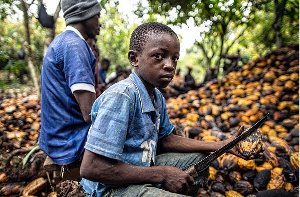 The report demanded systemic change to end cocoa poverty
The report demanded systemic change to end cocoa poverty
The 2020 Cocoa Barometer report has revealed that child labour in cocoa-growing areas remains rife as cocoa farmers are still faced with poverty, after two decades of failed interventions across the cocoa sector.
The report demanded systemic change to end cocoa poverty, stressing that after two decades of failed interventions, cocoa-farming communities are still battling the effects of poverty, child labour and deforestation.
“Twenty years into rhetoric, the challenges on the ground remain as large as ever. Poverty is still the daily reality for virtually all West African cocoa farmer families, child labour remains rife, and old growth forests continue to be cleared to make way for cocoa production,” the report said.
As a biennial review of sustainability in the cocoa sector, the report provides stark details of how little positive impact current and past interventions are having for the farmers at the beginning of the supply chain.
“Now is an important window of opportunity to move towards justice, as momentum for change is gathering across different stakeholders. Thanks to campaigning civil society organisations, the last two years have seen an increasing number of chocolate companies asking for regulation; significant global actors like the EU are committed to putting legislation in place; and the world’s two largest producers of cocoa, Cote d’Ivoire and Ghana, have formed a cartel to drive up the price for cocoa farmers,” the report stated.
The report’s co-author, Antonie C. Fountain, of the VOICE Network, said after two decades of voluntary initiatives that do not tackle the root causes, it is time for systemic change in the sector.
“All the ingredients are there to make it work, but it is now time to move forward and put in place ambitious, holistic and mandatory change, so that we can finally tackle the poverty, child labour and deforestation in cocoa.”
According to the report, to seize this moment, it is vital that the sector learns from its mistakes, or it risks repeating them.
The report said the last two decades of interventions have failed for three main reasons.
Firstly, it said efforts have only been voluntary, not mandatory, meaning that across the sector, actors are failing to do what they need to.
“Within the multitude of government-driven covenants, national multi-stakeholder platforms and sector-wide collaborations, there are no penalties for non-compliance from companies or governments, nor enforcement to meet targets.”
Secondly, it said while bad farming practices have been addressed, the underlying problems that exacerbate extreme poverty—including low cocoa prices, lack of infrastructure and no transparency and accountability as you move higher in the supply chain—remain unchallenged and unsolved.
“There needs to be recognition that in its current form, the business model for high yields of cocoa means poverty for farmers and excessive profit for chocolate manufacturers. It’s time this changed,” it added.
Thirdly, the report said efforts to solve complex issues of injustice and unsustainability in the cocoa sector have not been inclusive or holistic enough.
It said instead of inviting farmers and civic society to take a respected seat at the decision-making table, problems have been assessed using a top-down industry-based approach.
This, the report said, serves the interests of industry and government rather than the producer farmers and their communities.
“We are at the crossroads,” Isaac Gyamfi, Managing Director for Solidaridad in West Africa, said.
“Do we continue skirting around the issue of farmers’ wellbeing, or will all stakeholders together radically redesign value distribution and decision making in the cocoa sector? Let’s make space at the table and assure a living income, for both farmers and workers.”